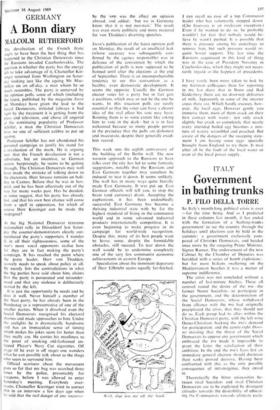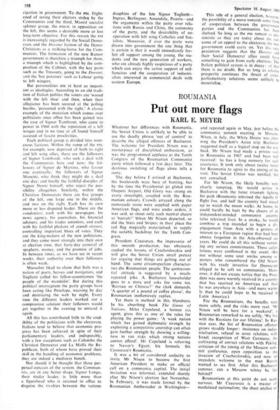ITALY
Government in bathing trunks
P. FILO DELLA TORRE
So Italy's month-long political crisis is over --for the time being. And as I predicted in these columns last month, it has ended with the formation of a 'bathing-truoks government' to sec the country through the holidays until elections can be held in the autumn: a government exclusively com- posed of Christian Democrats, and headed once more by the outgoing Prime Minister, Signor Rumor. The endorsement of the new Cabinet by the Chamber of Deputies was heralded with a series of bomb explosions: but for most Italians sweltering on the Mediterranean beaches it was a matter of supreme indifference.
The crisis was not concluded without a number of last-minute hitches. These all centred round the desire of the PSI—the former Nenni Socialists—to participate in the government, and the determination of the Social Democrats, whose withdrawal from alliance with the PSI had originally precipitated the crisis, that they should not do so. Each group had its allies within the Christian Democrat party, with the left wing Demo-Christians backing the PSI.ti demand for participation, and the centre-right Doro- tei insisting that the threat of the Social Democrats to oppose any government which embraced the PSI made it impossible to grant the latter the satisfaction of their ambition. In the end the PSI% fears lest an immediate general election should decimate their ranks proved decisive. Having been confronted with this as the only possible consequence of intransigence, they caved in.
Theoretically the bitter animosities be- tween rival Socialists and rival Christian Democrats arc to be explained by divergent attitudes towards the desirability of educat- ing the Communists towards ultimate parti-
cipation in government. To the PSI, fright- ened of seeing their electors stoleg by the
Communists and the third, Maoist socialist
splinter group, the PSIUP, in opposition on the left, this seems a desirable more or less long-term objective. For this reason the PSI is increasingly regarded by the Social Demo- crats and the Dorotei faction of the Demo- Christians as a stalking-horse for the Com- munists. The formation of the new Rumor government is therefore a triumph for them, a triumph which is highlighted by the com- position of the Cabinet, with the key posts such as the Treasury, going to the Dorotei, and the 'hot potatoes' such as Labour going to left wingers.
But personalities are at least as import- ant as ideologies. According to an old tradi- tion of Italian politics the voters are 'wooed with the left shoe' and then, when their allegiance has been secured at the polling booths, 'presented with the right.' A classic example of the mutation which comes over politicians once office has been gained was the case of Signor Tambroni, who came to power in 1960 with the reputation of a left winger and in no time at all found himself accused of fascist proclivities.
Each political group is divided into num- erous factions. Within the rump of the PSI, for example, now deprived of both its right and left wing allies, there are the followers of Signor Lombardi. who seek a deal with the Communists here and now; the fol- lowers of Signor de Martino, who favour one eventually; the followers of Signor Mancini, who think they might do a deal one day; and finally the faithful disciples of Signor Nenni himself, who reject the pos- sibility altogether. Similarly, within the Christian Democrats there are five groups of the left, one large one in the middle, and two on the right. Each has its own more or less disputed leader. There are the condottieri, each with his newspaper, his news agency, his journalists, his financial advisers, and his trades unionists, and each with his faithful phalanx of grandi elettori, controlling important blocs of votes. They are the king-makers of the new politicians, and they come most strongly into their own at election time, that forty-day carnival of spaghetti, money, and the promise of jobs. In between times, as we have see in recent weeks, their authority over their followers is often weak.
Mussolini liked to claim that Italy was a nation of poets, heroes and navigators, and Togliatti called his fellow-countrymen 'the people of the mandolin'. But during this political interregnum the party groups have been acting like Penelope, weaving by day and destroying the web by night. Every time the different leaders worked out a compromise solution their followers would get together in the evening to unravel it again. All this has contributed little to the cred- ibility of the politicians with the electorate. Italians tend to believe that economic pro- gress has been achieved in spite of their parliamentary leaders, and indisputably, with a few exceptions such as Colombo the Christian Democrat and La Malfa the Re- publican, both of whom have proved their skill in the handling of economic problems, they are indeed a mediocre bunch.
Nor should it be thought that those per- petual outcasts of the system. the Commun- ists, are in any better shape. Signor Longo, their titular leader, is little more than a figurehead who is retained in office to disguise the rivalries between the various dauphins of the late Signor Togliatti- Ingrao, Berlinguer, Amendola, Paietta—and the arguments within the party over rela- tions with Russia and China, the autonomy of the party, and the desirability of co- operation with left wing Catholics and Soc- ialists. Moreover, if ever the party were drawn into government the one thing that is certain is that it would immediately for- feit all support among the young, the stu- dents and the new generation of workers, who are already highly suspicious of a party which can enjoy the active support of mil- lionaires and the cooperation of industri- alists interested in commercial deals with eastern Europe.
This side of a general election, however, the possibility of a move towards some form of cooperation between the government parties and the Communists has been shelved. So long as the PSI remain as pes. simistic as they are today about the out- come of an appeal to the electorate the new government could carry on. Yet this very pessimism suggests that the Dorotei and their Social Democrat allies could base something to gain from early elections. The Italian political system is in decay: of that there is no doubt. But so long as relative prosperity continues the threat of extra- parliamentary solutions seems unlikely to materialise.



































 Previous page
Previous page